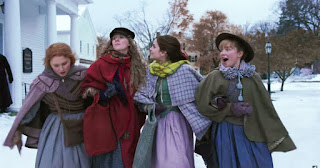Women in the realms of men: "Bombshell," "The Testaments," "Little Women"
The latest version of "Little Women," written and directed by Greta Gerwig, is a lovely adaptation of Louisa May Alcott's much-adapted novel, one made especially so by its emphasis on what it meant to be a woman in a world run by men. The options left to women are few: marriage is the main path to solvency, and writers of fiction must have young women married or dead by the end. That life turns out all right for most of them is appealing, but it's built on the idea that "Little Women" is a romance, and that in the real world sometimes you have to sell out a cherished idea in one area to achieve what you need elsewhere. And even though "Little Women" is set in the past, the idea of What Women Must Do is also part of the contemporary "Bombshell," as well as Margaret Atwood's novel "The Testaments."
These are all blending in my head because I saw "Bombshell" and "Little Women" on consecutive days recently, while reading "The Testaments" around them. These are also in a stew with other bits of pop culture I have encountered lately, such as "The Kitchen," the movie about women taking over their incarcerated husbands' crime organization, and the first episode of "Dare Me," the new USA series based on Megan Abbott's novel of the same name. "The Kitchen" echoed in part because the three stars include not only Melissa McCarthy and Tiffany Haddish but Elisabeth Moss of "The Handmaid's Tale," the Hulu series based on an Atwood novel to which "The Testaments" is a successor. "The Kitchen" also covers similar territory to the 2018 film "Widows," although "Widows" is a far, far better movie. Abbott's novels, which I very much admire, have most often dealt with women fighting for their own power in systems set apart for them from men's (in "Dare Me's" case, a high-school cheer-leading squad) and deciding what they are willing to do for that power.
To summarize: As long as men set the rules, being a woman is going to stink, But women's best hope of success is to work together, whether privately or openly, to make their own choices regardless of what men have in store for them.
That's an especially strong message in "Bombshell," which tells the story of the harassment scandals at Fox News through the characters Megyn Kelly (Charlize Theron), Gretchen Carlson (Nicole Kidman) and a fictional character, Kayla Pospisil (Margot Robbie), and their terrifying boss Roger Ailes (John Lithgow). However you may feel about the political views of Fox News -- which Kelly and Carlson abetted, and which Pospisil in the film supports strongly -- "Bombshell" is clear that harassment is never deserved, no matter the victim's beliefs. But it is also clear that one way harassment endures is that women do not help each other. Carlson, the scrappiest of the three in the movie, is in the cold when she complains about treatment because other women will not come forward with similar complaints. Kelly, trying to hold onto her power, is slow to say what has happened to her with Ailes -- even when it's obvious that the network will not back her against the scurrilousness of Donald Trump. But that means that Pospisil, lacking the profile and power of a Kelly, suffers because Kelly has kept quiet; had she spoken out sooner, then Pospisil might not have been victimized. Indeed, only when enough women come forward is Ailes cast aside -- albeit with an enormous buyout, and after Ailes has helped put a woman-hater in the White House.
"The Testaments," like "The Handmaid's Tale" before it, shows what kind of world would make Trump and his ilk happy -- one where women are subordinate in every way, and one where -- as Atwood says in the "Testaments" acknowledgments, "no event is allowed ... that does not have a precedent in human history." Readers of "The Handmaid's Tale" know that the nation of Gilead eventually falls, though it is not clear how; "The Testaments" answers that question, though my cynical side wonders if the answer is plausible. The book as whole, though, is fine, another delving into the oppression that mark the earlier novel and the TV series, with a focus on characters including Baby Nicole and Aunt Lydia, and much to say about behavior, social roles and how to dismantle a social structure which seems designed solely to hold onto its power. (With its emphasis on doings in what amounts to Gilead's underclasses, "The Testaments" reminds me of "Queen & Slim" and its movement through invisible parts of African-American culture.) But, again, over the course of the novel we find women helping each other as far as they can -- not all of them, just as many women at Fox News closed ranks behind Ailes -- and that a society rife with rottenness cannot stand forever. Decades, perhaps, but not forever.
In the context of those works, "Little Women" seems somewhat sunnier in its portraits of the March sisters; Jo (Saoirse Ronan), Meg (Emma Watson), Amy (Florence Pugh) and Beth (Eliza Scanlen). Moving back and forth across several crucial years (though not always clearly), Gerwig's film is not only about sisterly bonding -- their closeness so endearing in scenes like the one pictured above -- but how women could make their way. Jo writes, but is trying to fit a tightly controlled marketplace (a fine early scene has her work being read and edited by a stolid publisher played by Tracy Letts). Meg's acting and Amy's painting are essentially holding patterns while their sort out marital prospects. And Beth, well, as those with even a sketchy knowledge of "Little Women" knows what the world holds for them.
While there are men in their world -- notably the wealthy, diffident Laurie (Timothee Chalamet), they are mainly guided by women including their mother (Laura Dern) and aunt (Meryl Streep), the latter quite set on the idea that a financially sound marriage by at least one of the girls will help them all. Whether marriage -- any marriage -- can provide love and security is one of dilemmas faced by the sisters, as is whether a woman can keep a sense of self while marrying, There are different answers, and times when the sisters are at odds with each other. Still, by movie's end, women together have found fulfillment and support in a variety of ways, That they have also found love is part of the romance of the tale. But in the midst of all the struggles seen across these works I've been talking about, isn't there room for a happy ending?





Comments
Post a Comment